The majority of Parking Management Systems (PMS) offer one pay per use agreement and one fixed price agreement. In most cases the two agreement types are enough. A typical example of a fixed price agreement would be a tenant subscribing to 10 parking spots. As long as 10 vehicles or below are inside the defined parking area at the same time everything is pretty.
But what happens when vehicle #11 enters?
Worst case, the vehicle parks for free. Fortunately, most established free flow ALPR PMSes will send #11 an invoice to the end-users physical mailbox, based on vehicle register lookup. This practice might increase revenue for facility owners and/or PMSes due to the possibility of adding a service fee to the invoice, in addition to the actual price for the visit. Growing demands of digitalization, sustainability and end-user satisfaction will at some point reduce such operations and the PMSes will be required to check if #11 has a license plate number (LPN) added to a private agreement. If so, the end-user will be informed for free and charged that private agreement. If such a private agreement does not exist, an invoice will be sent as described above.
And what happens if the parking area is extended to more facilities/buildings?
The best-designed PMSes have functionality that solves this without making changes on an agreement level.
Hi! fulfils all above cases, but has taken the parking industry one step further and offers companies an agreement called limited pay per use (LPPU) agreement.
In the example above it means that, in addition to the 10 fixed priced spot agreement, the company can create another agreement dealing with the occasional overuse. The agreement can contain as many vehicles, including the vehicles on the fixed price agreement, as the company wants.
In the first print screen, from the Customer Support Module (CSM) in the Central System (CS), one can see that the vehicle on the last row exceeds the company quota and that particular visit will be added to a separate list of visits covering a defined time interval and charged, usually at the beginning of each month, either by credit card or by invoice. The second print screen shows a specific LPPU agreement.
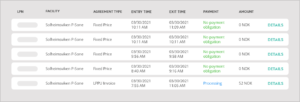
Customer Support Module – Showing LPPU agreement
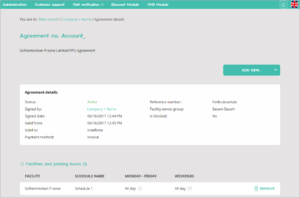
Customer Support Module – LPPU Agreement
The company, on their side, can log onto the Tenant Dashboard (TD) to administrate vehicles and payment, hereunder time period and detailed visits.
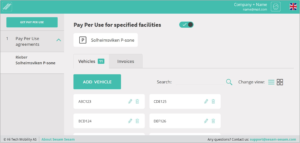
Tenant Dashboard – Vehicles
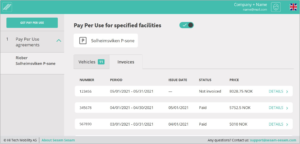
Tenant Dashboard – Invoices
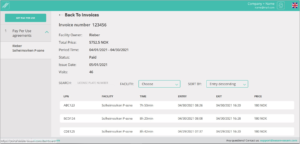
Tenant Dashboard – Invoice details
Other edge-cases of fixed price agreements have been that the facility owner wants fixed price agreements to be valid on a certain parking area only during the night or that employees use the company agreement in their spare time. To mitigate such cases Hi! can offer schedules; meaning the facility owner or company can choose to pay for employee parking between certain time intervals on defined dates on defined parking areas, for example only between 08:00 to 17:00 from Monday to Friday at two out of five parking areas. But that is another story (blog post). . .

